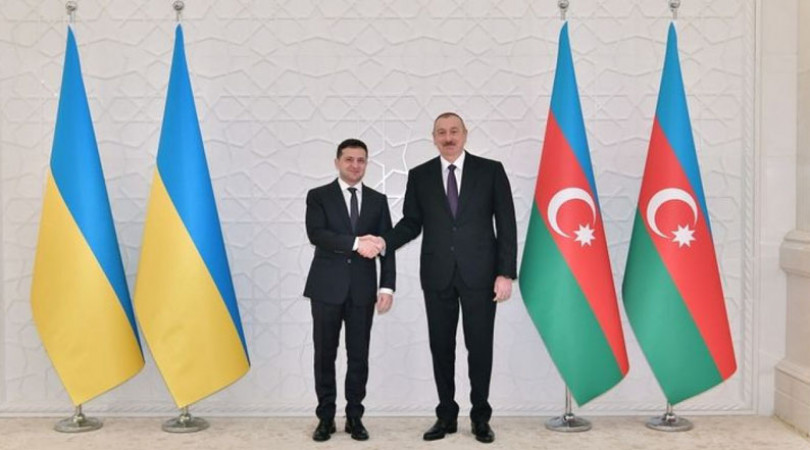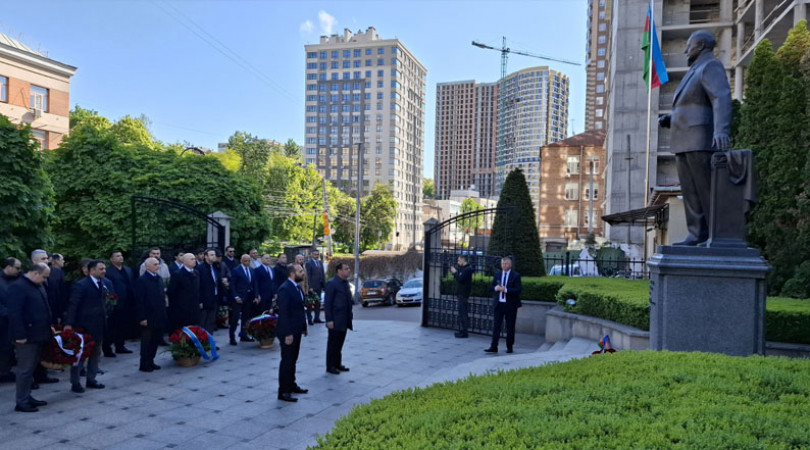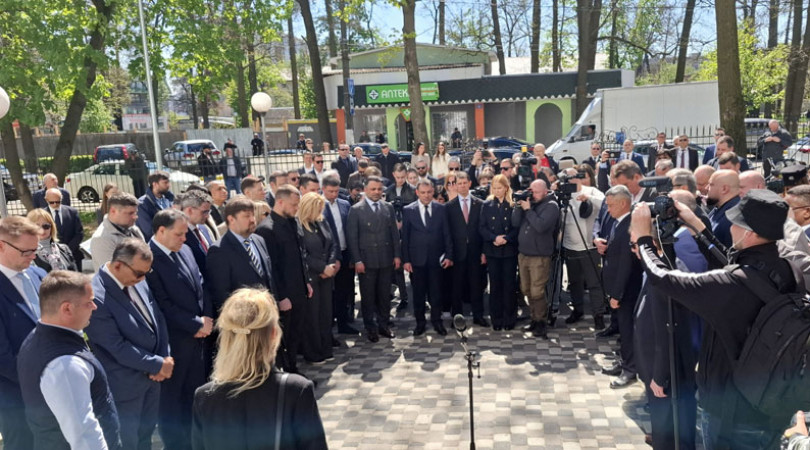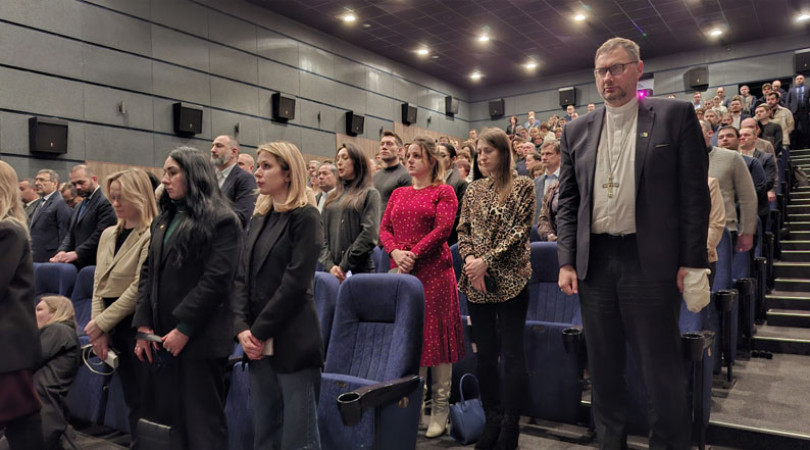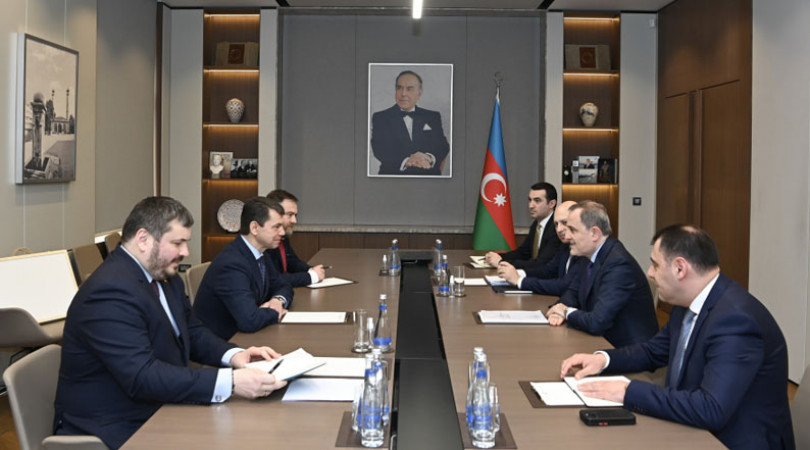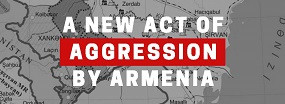Letter of H.E. Mr. Mukhtar Babayev, COP29 President-Designate, Minister of Ecology and Natural Resources of the Republic of Azerbaijan to Parties and Constituencies
Dear Colleagues,
Since assuming the responsibility to host this year’s climate negotiations, my team and I have been listening intently to all Parties, Constituencies and all other non-Party stakeholders. In our many engagements, we have been humbled by the challenges you are facing, inspired to hear how you are responding, and encouraged to see that you have the will to move forward. I am confident that there is a clear and common desire to make COP29 a success.
Climate change is not a future risk, it is a real and present danger to billions of people around the world. I have recently witnessed the perilous impacts of climate change as I have visited communities on the frontlines, from Small Island Developing States (SIDS) to the Least Developed Countries (LDCs). Climate change threatens to undermine decades of progress in global development, with devastating consequences for so many, while climate action promises a better future for all.
Growing geopolitical tensions and uncertainty in the international environment must not distract us from the imperative to collaborate and address climate change as the greatest transnational challenge of the century.
I am grateful for the direction and support I have received from the President of Azerbaijan, H.E. Mr. Ilham Aliyev. As President Aliyev mentioned, we are honoured by the confidence and trust you have placed in us by unanimously agreeing to choose Azerbaijan as the COP29 host country and to lead this year’s climate talks. We will spare no efforts to act as a bridge between the developed and developing nations and steer the process to a consensus at COP29. It is critical now more than ever to act on climate change as a common commitment, a moral duty and an unmissable opportunity for sustainable development. I know that this is also a direction that your leaders provide and that your peoples expect.
Now I wish to set out the principles I want us all to focus on, to present the COP29 Presidency’s vision to enhance ambition and enable action, outline the key presidency milestones, lay out the pathways that we must follow to turn our vision into a reality, and highlight collaborative networks for complementary action.
Principles of Action
The multilateral system is under pressure to show it can deliver at the speed and scale needed. COP29 will be a litmus test for the Paris Agreement and global climate action and cooperation. We must address all of the most fundamental and pressing issues at COP29, with a new collective quantified goal (NCQG) as a centrepiece.
Our actions should be guided by the latest science and informed by the outcomes of the Global Stocktake, agreed by Parties at COP28, with its roadmap for keeping 1.5C within reach, while leaving no one behind. COP29 will be essential to delivering the means of implementation and support, and ensuring that everyone reaches for the highest possible ambition reflecting equity and the principle of common but differentiated responsibilities and respective capabilities, in the light of different national circumstances.
We have to be steadfast in our determination to fulfil past promises, deliver on our mandates, and build on the process so that it can address the urgency and scale of the crisis.
As a Presidency we are committed to delivering COP29 in a transparent, impartial, inclusive and party-driven manner. We now need everyone to take ownership of the process and engage in good faith to act swiftly.
We are fully committed to inclusivity throughout the process, and during the Bonn sessions alone, the COP29 Negotiating Team led by Chief Negotiator Yalchin Rafiyev held over 170 consultations. In particular, we wish to thank the UNFCCC Constituencies, whose inputs have already been invaluable. We have had monthly engagements with Constituencies and will establish a “Friends of the COP29 Presidency” open to all Constituencies to ensure that our plans take into account their priorities and concerns. This will help us channel a diversity and wealth of solutions to help us address our common challenges.
We have appointed the COP29 UN High-Level Champion, Nigar Arpadarai, to engage with non-Party stakeholders on global climate action and all members of the COP29 Presidency will continue to consult with them. The COP29 Youth Climate Champion, Leyla Hasanova, is leading our work on training young educators and youth in party delegations.
Parties’ upcoming climate plans must also be inclusive, reflecting the needs of all, including Indigenous Peoples, local communities, women, youth, and all Constituencies.
To keep 1.5C within reach and leave no one behind, we will need to work in harmony in multiple cross-cutting dimensions. We need to advance across all climate pillars, involve global, regional, national and subnational groups, take a holistic view of sustainable development, and include all demographics within an inclusive process that delivers inclusive outcomes. This has been the basis for the development of the COP29 vision to enhance ambition and enable action.
The Two-Pillars of the COP29 Vision: Enhance Ambition, Enable Action
Throughout the COP29 Presidency’s consultations we have presented our vision based on two parallel pillars to enhance ambition and enable action, with climate finance as our top priority. These pillars are mutually reinforcing – progress on each sends a strong signal in support of the other. Successful delivery of key mandates and action will be essential to building trust, solidarity, and momentum.
We have further developed our ideas based on your input and feedback and we believe that there is a broad agreement on the principles of the way forward.
All countries must strive for the highest possible ambition, in line with the Paris Agreement and informed by the Global Stocktake. We also know that support for developing countries will allow for higher ambition in their actions. We now need to increase the overall flow of climate finance substantially and help developing countries that need support to realise their full potential.
Enhancing ambition involves setting out clear plans to keep 1.5 within reach and leave no one behind in accordance with the purposes, goals, and principles of the Paris Agreement. The key elements of enhancing ambition will be for the Parties to signal their own determination to act with ambitious, comprehensive, and robust Nationally Determined Contributions (NDC), National Adaptation Plans, and Biennial Transparency Reports, as well as their wider engagement in international cooperation.
Enabling action involves putting in place the means of implementation and support – finance, technology and capacity building – and the wider enabling conditions at a national, regional and global level spanning across all stakeholders. The COP29 Presidency’s top negotiating priority is agreeing a fair and ambitious New Collective Quantified Goal on climate finance (NCQG) adequate to the urgency and scale of the problem, taking into account the needs and priorities of developing country Parties. Our efforts should include the full scope and potential of the resources that need to be made available. We are also committed to finalising the operationalisation of Article 6 as a long overdue priority. Strengthening multilateral financial institutions and climate funds will also be an important contribution to creating the international enabling environment for success, and we are working towards fully mobilising the private sector and philanthropy for climate action.
Every day that slips away increases the toll on the ground for millions of people. It is imperative that we act swiftly on loss and damage, including with regard to the Fund for responding to Loss and Damage.
The COP29 Presidency’s vision is also the foundation of our action agenda and thematic programme, and progress on the different elements of the two pillars will help support action across all thematic issues. This includes finance, trade and investment, energy, biodiversity, sustainable agriculture, water, science, technology and innovation, sustainable urbanisation, and health, amongst other global priorities.
Presidency Milestones
We have heard strong calls that collectively at COP29 we need to make progress across all pillars of the Paris Agreement, with climate finance as a centrepiece. As a Presidency, we are committed to ensuring that Party and non-Party stakeholders have spaces available to discuss and progress means of implementation and support, mitigation, adaptation, and loss and damage.
During SB60, we made some progress on the agenda items, and the COP29 Presidency is grateful for the hard work of the Parties, the UNFCCC Secretariat and Executive Secretary Simon Stiell and the SB chairs, Harry Vreuls and Ambassador Nabeel Munir. However, divergent views among Parties held us back from making the necessary progress. We clearly need a rapid increase in the pace of our work and a renewed commitment to bridge the gaps between us. Time lost is lives, livelihoods and the planet lost.
We will convene a Heads of Delegation level retreat in Azerbaijan from 26-27 July, and we have invited representatives from all negotiating groups. We will use the meeting to focus on the NCQG and ensure progress on negotiations across all pillars of the Paris Agreement, including key mandates such as Article 6. A summary of the discussions will be distributed to all Parties and Constituencies.
We have appointed Ministers Dan Jørgensen of Denmark, and Dr. Yasmine Fouad of Egypt as ministerial pairs for the NCQG and will circulate an information note on their mandate and modalities for consultations shortly. We are consulting with Parties on the appointment of further pairs on other key issues and we expect to make further announcements in September.
During the UN General Assembly and New York Climate Week the COP29 Presidency will engage with all Parties and Constituencies. We will host a high-level energy dialogue with the IEA and an event on NDC ambition with the “Roadmap to Mission 1.5” Troika, amongst others. We will also support the efforts on putting together a global renewables summit with COP28, Global Renewables Alliance (GRA), Bloomberg Philanthropies, IEA, IRENA and other partners. A full agenda for each of these events will be circulated in due course.
Ahead of COP29, we will host representatives of negotiating groups and Constituencies at Pre-COP in Baku on 10-11 October. A full agenda will be distributed in September. We will also host a High-Level Ministerial Dialogue on the NCQG on 9 October ahead of Pre-COP.
We will commence COP29 by hosting Heads of State and Government at the official opening on 11 November and the World Leaders Climate Action Summit on 12-13 November. We are inviting all world leaders to attend and will provide further information about the Summit in September. We call on leaders to come ready to make commitments on how they are advancing the Paris Agreement. During this Summit, we will seek to build consensus and momentum around the two pillars of the COP29 Plan to enhance ambition and enable action and demonstrate to all stakeholders that there is clear political will to deliver across all mandates.
We will also host leader-level dialogues that will address key topics, including raising ambition for mitigation and adaptation through NDCs, National Adaptation Plans (NAPs) and long-term low greenhouse gas emission development strategies, enabling action with the NCQG and other means of implementation and support, as well as addressing loss and damage and fully operationalising the Fund for responding to Loss and Damage and the Santiago Network.
Following the leader-level events, we want COP29 delegates to focus on thematic issues across seven days, with space to platform new initiatives, celebrate success and share best practices. The full list of thematic days and Presidency hosted/ organised events is included in Annex 1 and Annex 2. We will also work with the UNFCCC Secretariat to ensure programming on thematic days are scheduled coherently with mandated events – especially ministerial and other high-level meetings.
Under the framework of these thematic days, we have Presidency initiatives that will incorporate global and regional action and will provide a platform for all stakeholders to enhance ambition and enable action. We are in the process of developing and consulting on a range of commitments, declarations, initiatives, platforms, and packages of support that will build momentum on the two pillars of our vision, and will issue a separate communication on initiatives in due course.
To ensure continuity and interoperability with existing international frameworks, we have partnered with UN and international agencies in the development and delivery of this action agenda.
Gender equality and youth empowerment will be considered as cross-cutting elements across all thematic days and initiatives, with the support of the COP29 UN High-Level Champion, Nigar Arpadarai and COP29 Youth Climate Champion, Leyla Hasanova.
Pathways to Delivery
1. Enabling Action
Finance and The New Collective Quantified Goal on Climate Finance (NCQG)
Adopting the NCQG will be a pivotal moment for whether Parties can make progress on the means of implementation and support, and the Paris Agreement more broadly. This will be the first major finance goal after the Paris Agreement and we are sparing no effort to support the Parties to reach consensus.
The COP29 Presidency’s top negotiating priority is to agree a fair and ambitious NCQG, taking into account the needs and priorities of developing country Parties. But this is not just our priority. The COP29 Presidency has heard the voices of so many Parties and communities that are counting on all of us to take this step at COP29. We must all go the extra mile together to deliver this historic milestone.
The new goal will be a critical component of responding to the outcomes of the Global Stocktake. Both adaptation and mitigation financing require a substantial increase, and the upcoming determination of the needs of developing country Parties by the Standing Committee on Finance will also be a key consideration as we seek increased contributions for climate finance.
Our work on climate finance should represent progression beyond previous efforts, delivering multiples, adequate to the scale and urgency of the problem. Transparency and accessibility will also be key facilitating conditions that will require effort from multiple stakeholders.
SB60 was an important moment for the Ad Hoc Work Programme to make progress on a pathway towards a substantive framework for a draft negotiating text. The COP29 Presidency has full trust and confidence in co-chairs, Fiona Gilbert and Zaheer Fakir, as they prepare the next input paper to help focus discussions, bring together options into potential solutions and narrow down the choices as much as possible, to help facilitate more clearly structured consultations.
The technical work is an essential foundation. However, climate finance has been one of the most challenging topics in the negotiations and climate diplomacy more broadly, and the politically complex issues will not be solved by negotiators alone.
We have heard clearly from the Parties that there are disagreements on key elements that will require political direction and we must focus high-level discussions on these points. The COP29 Presidency is now intensifying political engagement, we thank our new ministerial pairs on the NCQG for their time and their commitment to support us, and we call on all Parties to increase the pace of their work and move on from their early negotiating positions. The NCQG will be amongst key issues to be addressed at the Heads of Delegation retreat in Azerbaijan in July.
We will host the 11th Technical Expert Dialogue and 3rd meeting under the Ad Hoc Work Programme on the NCQG on 10-13 September in Azerbaijan, and a High-Level Ministerial Dialogue on the NCQG on 9 October ahead of Pre-COP. Meanwhile, Parties need to reach out to each other directly and use the inter-sessional period to make as much progress as possible in the run-up to COP29.
Furthermore, ministries of finance and equivalent must be included early in the process. The COP29 Presidency has been raising the NCQG on the political agenda with heads of state and ministers in all multilateral and bilateral forums. We need relevant ministries and ministers to be familiar with the key negotiating issues and ensure that negotiators and ministers arrive at COP29 with a mandate that allows for a fair and ambitious NCQG outcome.
While it is regrettable that the $100 billion goal was not met on schedule, the COP29 Presidency welcomed the OECD’s announcement that for 2022 developed countries have jointly mobilised $115.9 billion. We urge them to continue efforts to meet the $100 billion goal through to 2025 with greater clarity and transparency. This will be essential to demonstrating that we can keep to our commitments and we can set a new goal with confidence.
Article 6
Article 6 is a core and necessary element of the architecture of the Paris Agreement. Its full functioning will be a significant step to bolster ambition in mitigation and adaptation, enhance capital markets, create viable economic models for climatepositive action and technologies, channel financial and technical resources, including to the developing world, and enable those who need carbon markets to implement their climate plans.
Although plenty of work has been done over these years, after almost a decade, our inability to fully operationalise it has been disappointing. The COP29 Presidency is committed to finalising the operationalisation of Article 6 this year as a priority. This is essential to meeting the goals and ambitions of the Paris Agreement and the COP29 Presidency’s vision to enhance ambition and enable action.
In recent months and at SB60, there was clear will to advance work on Article 6 and the COP29 Presidency elevated it as a priority to create momentum. We are committed to take it further and get it to the finish line at COP29. We need to use the inter-sessional period to make as much progress as possible through all the complex issues across both technical and political tracks and identify possible landing zones. We need to fully use the mandated hybrid inter-sessional workshop and technical meetings to make progress. We encourage Parties to show greater commitment and flexibility, and engage in bilateral dialogues.
The COP29 Presidency will support this endeavour by creating the space and opportunity for inclusive and transparent engagements in the run up to COP29. We will use the opportunity of the Heads of Delegation retreat in Azerbaijan to discuss Article 6 to help find common ground and continue constructive momentum.
Loss and Damage
To protect vulnerable communities who stand to lose the most from the climate crisis, particularly in SIDS and LDCs, mechanisms for financial support are essential and we must act without delay. At COP27 and COP28 we made historic progress, but more needs to be done to keep the momentum going and fully operationalise the Fund for responding to Loss and Damage, so that it can begin disbursing much needed and long-awaited funds as soon as possible.
The first and second meetings of the Board of the Fund have provided important and positive progress. The COP29 Presidency expects the Board to continue accelerating substantial progress throughout the year to ensure the timely and accessible delivery of adequate funds.
We will host the third meeting of the Board from 18 September to 20 September in Baku, Azerbaijan. All stakeholders must demonstrate a clear commitment to working urgently, inclusively, and transparently, to make the Fund better able to deliver effectively on its mandate.
The first pledges to the Fund were welcome. However, significantly more will be needed to protect those who are particularly vulnerable to the adverse effects of climate change and respond to loss and damage, so we are calling for further pledges to the Fund.
The COP29 Presidency also urges the different funds and financial mechanisms to increase their coordination to improve coherence and better address loss and damage.
We also support coordination and coherence within the overall loss and damage landscape consisting of the Warsaw International Mechanism, Santiago Network and the Fund for responding to Loss and Damage. In this regard, we continue to support the full operationalisation of the Santiago Network, so that technical assistance can be accessed as quickly as possible by those at the frontline of climate change.
2. Enhancing Ambition
Nationally Determined Contributions (NDCs) and Mitigation
It is essential that we implement the Global Stocktake outcomes, in a nationally determined manner, to keep us on track to a 1.5-aligned and climate resilient world in line with the Paris Agreement. Last year in paragraph 28 of the Global Stocktake, Parties recognised the need for deep, rapid and sustained reductions in greenhouse gas emissions in line with 1.5C pathways and called on parties to contribute to the global efforts in a nationally determined manner, taking into account the Paris Agreement and their different national circumstances, pathways, and approaches.
This included tripling renewable energy capacity globally and doubling the global average annual rate of energy efficiency by 2030, accelerating and substantially reducing non-carbon-dioxide emissions globally including in particular methane emissions by 2030, and accelerating efforts towards the phase-down of unabated coal power.
It also made the first reference to fossil fuels in a COP outcome, with a call on Parties to contribute, in a nationally determined manner, towards transitioning away from fossil fuels in energy systems, in a just, orderly and equitable manner, accelerating action in this critical decade, so as to achieve net zero by 2050 in keeping with the science.
As the COP29 Presidency, we encourage all Parties to come forward with their own 1.5-aligned NDCs at the earliest opportunity and well ahead of the 10 February 2025 deadline. NDCs should be informed by the science and the Global Stocktake outcome, in light of different national circumstances and foster investment and support.
The COP29 Presidency will lead by example. As we announced with our Troika partners, Azerbaijan, the UAE and Brazil are working on submitting 1.5-aligned NDCs. COP29 CEO Elnur Soltanov and Deputy Minister of Ecology and Natural Resources Umayra Taghiyeva are leading an interagency working group to submit Azerbaijan’s NDC early and prepare its first Long-Term Development Strategy (LTS). Azerbaijan will integrate its NDC within its LTS and we call on all Parties to ensure that they are working across their respective governments to mainstream climate action into their sustainable development aspirations and priorities.
We are also working within the Troika on a set of activities to significantly enhance international cooperation and the international enabling environment to stimulate ambition in the next round of NDCs. As a Troika, we will issue a separate communication to all Parties shortly on activities planned for the UN General Assembly, the G20 Joint Ministerial on Climate and Finance, Pre-COP and during COP29.
We are partnering with the UN Secretary General and the entire UN system to ensure that Parties receive support to design and implement NDCs, and upon the Troika’s call to the UN Secretary General, UNDP has launched its Climate Promise 2025 initiative to provide capacity-building support. We also welcome the launch of UNFCCC’s NDC 3.0 Navigator and invite Parties to use this toolkit in the process of designing new NDCs.
We are committed to providing a space for Parties to deliberate on mitigation and the just transition. At the retreat in Azerbaijan later this month, we will address these issues, among others. We will also ensure there is space outside the negotiations on these important issues and have already hosted two high-level energy dialogues with the IEA, with the third planned on the sidelines of the UN General Assembly in September.
We will also put a spotlight on how all Parties can integrate non-carbon dioxide emissions into their upcoming NDCs and will create spaces in our thematic programming to collaborate on agriculture, waste, methane and other non-CO2 greenhouse gases.
We will co-host a methane workshop with the IEA in Baku in October, and we are co-organising a methane and non-CO2 greenhouse gases summit with the US and China at COP29.
National Adaptation Plans and Adaptation
The Global Stocktake found that adaptation efforts are not on track to achieve our long-term goals. It called for urgent, incremental, transformational and country-driven adaptation action based on different national circumstances, while recognising the significant challenges developing country Parties face in accessing finance for implementing their National Adaptation Plans (NAPs) and Adaptation Communications.
Responding to the Global Stocktake, we all need to have National Adaptation Plans, policies and planning processes in place by 2025 so that we can make progress in implementing them by 2030. These plans will guide how we share best practice, transfer technology, and support each other’s ambitions. Azerbaijan is currently working to submit its NAP and we call on all Parties to commit to producing NAPs by 2025 or earlier.
Adaptation finance is crucial to delivering outcomes on the ground, and we need effective, efficient, and expedited support to implement adaptation ambitions. In the Global Stocktake, Parties recognised that adaptation finance will have to be significantly scaled up beyond the doubling agreed at COP26 to support the urgent and evolving need to accelerate adaptation and build resilience in developing countries. The COP29 Presidency calls on developed countries to show significant progress on at least doubling adaptation finance by 2025 and underscores the need to balance adaptation and mitigation finance.
The COP29 Presidency emphasises the urgent need for continued and increased contributions to funds, including the Green Climate Fund and the Adaptation Fund, and we are also working with the funds to improve functionality for adaptation finance. We are also calling for the Green Climate Fund to expedite support for the formulation and implementation of NAPs.
The UAE Framework for Global Climate Resilience was an important step forward in developing thematic and dimensional targets that aim to guide the achievement of the Global Goal on Adaptation and the review of overall progress in achieving it. In our thematic programme we will provide a platform for Parties to collaborate across several of the key areas identified in the framework, and deliver solutions on water, agriculture, health, biodiversity, and infrastructure and human settlement. We are committed to supporting the UAE-Belem work programme to develop indicators for measuring progress on the targets outlined in the Framework. We must give this programme the urgency it deserves and utilise the time available to make concrete and early progress on indicators.
Biennial Transparency Reports and Transparency
Transparency is central to mutual trust within the UNFCCC process. Considering the constrained timelines to deliver the upcoming Biennial Transparency Reports (BTRs), the COP29 Presidency is raising the profile of transparency and BTRs. These BTRs will be essential to track progress on commitments and assess gaps and financial needs.
The COP29 Presidency has been actively working with the UNFCCC to ensure that the Enhanced Transparency Framework (ETF) reporting tools are ready on time, and to build confidence amongst the parties in the process. These online reporting tools have officially launched, we welcome the first BTRs submissions, and we now need to get the process moving. We will all learn by doing, and the process and the results will be improved in the future.
Azerbaijan will lead by example and is working to submit its own BTR ahead of COP29. We urge others to join us with early submissions ahead of COP29, and we will organise a platform for Parties to demonstrate their commitment to transparency and the timely publication of their BTRs. We are also calling on international organisations mandated to provide financial, technical and capacity building support to Parties to speed up the process.
The COP29 Presidency has launched a process to support parties and broaden participation in the ETF. This initiative began with series of workshops, starting in Azerbaijan in May, to support Parties to build capacity to meet their obligations. Further workshops are planned in Baku in early September, to focus on IPCC Inventory Software and the linkages of the software with the UNFCCC Reporting Tool. We will conduct workshops with several partners for regional groupings, including Eastern Europe, South Caucasus and Central Asia, Africa, Asia-Pacific and Latin America and the Caribbean. We will also host online sessions to ensure the widest possible participation.
Beyond the December 2024 BTR deadline, this initiative will continue to serve as a platform for targeted support, capacity-building, and exchanging experiences on lessons learned.
Collaborative Networks for Complementary Action
Meaningful and ambitious climate action is already being demonstrated by diverse actors, including the G7 and G20. All stakeholders must continue to demonstrate leadership and action to address the climate crisis.
The COP29 Presidency welcomes the G7’s support for climate action, as expressed in its latest leaders’ summit, inter alia its commitment to submit 1.5-aligned NDCs, phase out existing unabated coal power generation during the first half of the 2030s, and its intention to be contributors towards the new climate finance goal. The G20 leaders’ summit in November will be an important moment to support enhancing ambition and enabling action. The COP29 Presidency calls on the G20 to come forward with early and ambitious announcements on climate action and cooperation, to help deliver solutions on the most complex climate issues.
COP29 is working with Brazil as the COP30 and G20 Presidency, as well as with the G20 member countries. The G20 Task Force for Global Mobilisation Against Climate Change is an important forum to act on climate issues. Azerbaijan and Brazil will collaborate together to launch the Baku to Belem (B2B) initiative to enhance ambition and enable action, to further global climate action in this critical decade to keep 1.5C within reach.
We are also building further linkages among the Rio Conventions on climate change, biodiversity, and desertification to ensure coordination, leverage synergies, and cooperate on crosscutting issues. We have initiated collaboration with the Colombian Presidency of COP16 to the Convention on Biological Diversity and the Saudi Presidency of COP16 to the Convention to Combat Desertification, and are inviting them for a joint meeting during COP29.
Global financial institutions have a significant role to play in supporting developing countries to take climate action. As shareholders, Parties, particularly from the G7 and G20, should work with their colleagues across government to ensure that these institutions are not standing on the sidelines. It is essential that multilateral financial institutions show how they are progressing on the outcomes of the Global Stocktake at COP29, including increasing the scale, and effectiveness of, and simplified access to, climate finance.
During the Spring Meetings, the COP29 Presidency called on the World Bank, IMF, and other multilateral financial institutions to deliver a step change on climate action. We will use every opportunity, including the next round of annual meetings, and ministerial gatherings of the TF CLIMA, to engage with all stakeholders and strengthen their response to the climate crisis. The COP29 Presidency is calling on all institutions to review their levels of capitalisation, climate-allocation ratios, relevant financial policies, and accessibility procedures for developing countries, in particular LDCs and SIDS to ensure that they meet the urgency of the climate crisis and the needs of developing countries. COP29 will provide a platform for investment partnerships with MDBs that cover all economic sectors, not just energy, as part of our thematic day agenda on finance, investment and trade.
The private sector is a critical partner in delivering climate action at scale and the COP29 UN High-Level Champion, Nigar Arpadarai, leads our work to involve them in COP29. We will run programmes with SMEs to collaborate on best practices, build capacity and climate literacy, and create partnerships with global companies and financiers. We will focus on climate innovators and “green disruptors” to ensure that they have the funding, training and resources necessary to implement and scale climate solutions. We will put a spotlight on key priority areas of innovation, including water, renewable energy, zero and low-emission technologies, and food security, amongst others.
During COP29, we will host a Business and Philanthropy Forum, to mobilise participants and secure commitments to climate action. Businesses have already made progress committing to net zero, and they must now deliver and avoid backsliding. The private sector needs to show leadership on transparency, and we urge companies to demonstrate their proactive commitment to robust disclosure procedures at COP29. We call on companies to come to COP29 ready to show how they are allocating capital and ensuring investment decisions contribute towards our climate goals.
Conclusion
As the COP29 Presidency prepares to host and lead this year’s climate summit, we will continue to listen and engage, and I thank everyone for your time, openness, and constructive spirit. Your feedback is essential.
We are optimistic that together we can make real progress. When the world comes to COP29 in Azerbaijan, we want everyone to focus on our moral duty and collective interest to confront the climate crisis. COP is a party-driven process, and we need all hands-on deck as billions of people are counting on you to meet these responsibilities and seize these opportunities.
I look forward to welcoming you all to Baku in November as we face up to the defining test of COP29 to enhance ambition and enable action. This can be when we empower everyone to move forward in solidarity for a green world.
H.E. Mukhtar Babayev
COP29 President-Designate
Minister of Ecology and Natural Resources,
Republic of Azerbaijan
Letter of COP29 President-Designate, Minister of Ecology and Natural Resources of the Republic of Azerbaijan to Parties and Constituincies
Annex 1: COP29 Two Week Agenda and Thematic Days
November 11 COP29 Opening
November 12 World Leaders Climate Action Summit
November 13 World Leaders Climate Action Summit
November 14 Finance, Investment and Trade
November 15 Energy / Peace, Relief and Recovery
November 16 Science, Technology and Innovation / Digitalisation
November 17 Rest Day and No Thematic Programming
November 18 Human Capital / Children and Youth / Health / Education
November 19 Food, Agriculture and Water
November 20 Urbanisation / Transport / Tourism
November 21 Nature and Biodiversity / Indigenous People / Gender Equality / Oceans and Coastal Zones
November 22 Final Negotiations
Annex 2: Key Calendar Moments
|
Heads of Delegation Retreat |
July 26-27 |
Shamakhi, Azerbaijan |
|
BTR Workshops for Regional Groups |
September |
|
|
11th Technical Expert Dialogue and 3rd meeting under the Ad Hoc Work Programme on the NCQG |
September 10-13 |
Azerbaijan |
|
3rd meeting of the Board of the Fund for responding to Loss and Damage |
September 18-20 |
Baku, Azerbaijan |
|
High-Level Energy Dialogue co-hosted with IEA |
September |
New York, United States |
|
Methane Workshop co-hosted with IEA |
October |
Baku, Azerbaijan |
|
High-Level Ministerial Dialogue on the NCQG |
October 9 |
Baku, Azerbaijan |
|
Pre-COP |
October 10-11 |
Baku, Azerbaijan |
|
2nd Business and Philanthropy Climate Forum |
November |
Baku, Azerbaijan |
|
Methane and non-CO2 greenhouse Gases Summit |
November |
Baku, Azerbaijan |
|
World Leaders Climate Action Summit |
November 12-13 |
Baku, Azerbaijan |
|
COP29 |
November 11-22 |
Baku, Azerbaijan |

